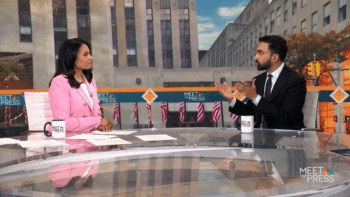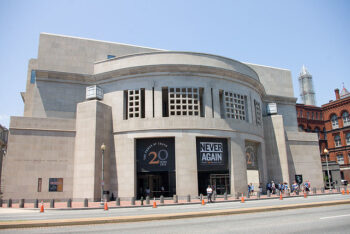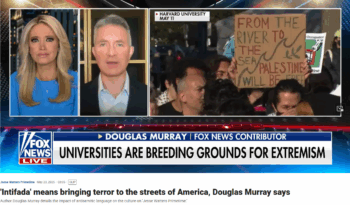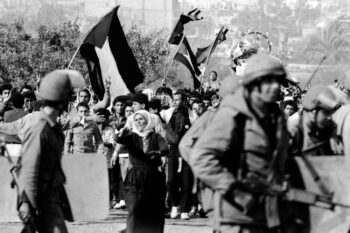
Zohran Mamdani to Kristen Welker (Meet the Press, 6/29/25): “Freedom and justice and safety are things that, to have meaning, have to be applied to all people, and that includes Israelis and Palestinians as well.”
Meet the Press host Kristen Welker (6/29/25) showed courage by interviewing Zohran Mamdani, the winner of the Democratic mayoral primary for New York, after he’d been widely attacked by corporate media. But unfortunately, she fell into a trap that has been set repeatedly in recent months to smear Mamdani. She asked him to condemn the phrase “globalize the intifada,” claiming—without offering evidence—that the term “intifada” refers to “violence against Jews.”
I doubt Welker is an Arabic linguist. But as a Palestinian journalist who covered the Intifada and helped introduce the term to Western media, I am appalled by this misrepresentation. Not only is the translation wrong, it’s an insult to the thousands of New York Jews who voted for Mamdani.
For the record, intifada translates to “shake off.” Palestinians used the term to describe their popular resistance against an Israeli occupation of their land that had no end in sight. It emerged amid a steady expansion of illegal settlements, which were systematically turning the occupied territories into a Swiss cheese–like landscape, precisely designed to prevent the establishment of a Palestinian state.
As someone who reported on the Intifada and explained its meaning to international audiences, I can say unequivocally: Intifada was used by Palestinian activists to describe a civil resistance movement rooted in dignity and national self-determination.
Metaphor for liberation

The Arabic-language version of the website of the US Holocaust Museum translated the Warsaw Ghetto “Uprising” as “Intifada”—until blogger Juan Cole (5/1/24) pointed this out. (Creative Commons photo: Phil Kalina.)
Let’s begin with the word’s literal meaning. As noted, in Arabic, intifada simply means “shaking off.” Since many—including Jewish leaders, Christian Zionists and GOP officials—have distorted the peaceful intentions behind the word, I turned to a source that might resonate more clearly with people of faith: the Bible.
In the Arabic version of the Old Testament, the word intifada appears three times, both as a noun and a verb. Looking at its English equivalents in the New International Version (though other translations are similar) offers enlightening context:
- Judges 16:20: “Samson awoke from his sleep and thought, ‘I’ll go out as before and shake myself free.’”
- Isaiah 52:2: “Shake off your dust; rise up, sit enthroned, Jerusalem. Free yourself from the chains on your neck, Daughter Zion, now a captive.”
- Psalm 109:23: “I fade away like an evening shadow; I am shaken off like a locust.”
Each of these examples uses the term intifada—shaking off oppression, captivity or anguish—as a metaphor for liberation, not violence.
While Google Translate and other modern tools often render intifada as “popular uprising,” its literal meaning—“to shake off”—captures the spirit with which Palestinians adopted the term. When they launched the first Intifada in 1987—after 20 years under a foreign military occupation—it was an expression of a desire to wake up, rise and throw off the chains of subjugation. It is not inherently antisemitic, nor does it refer by default to terrorism or violence.
While accompanying international journalists covering the protests, I often discussed this with them. In Jerusalem, I explained to LA Times bureau chief Dan Fisher, the Washington Post’s Glenn Frankel and the New York Times’ John Kifner what Palestinians meant by the word. I told them that throughout Palestinian patriotic literature and slogans, two distinctions were always made: The Intifada was a protest against the Israeli occupation, not against Jews or the existence of Israel, and that the ultimate goal was to achieve an independent Palestinian state alongside Israel.
Fisher, Frankel and Kifner included these clarifications in their reports, helping the Arabic term intifada enter the global lexicon with its intended meaning.
‘Bringing terror to the streets of America’

To define “intifada,” Fox News (5/23/25) brought on Douglas Murray, who calls Islam an “infection” and declares that “all immigration into Europe from Muslim countries must stop.”
But today, as protests against Israel’s devastating war on Gaza mount, the word is being twisted. When Rep. Elise Stefanik grilled the presidents of UPenn, Harvard, and MIT in December 2023 about pro-Palestinian chants invoking “intifada,” she equated the term with “genocide of Jews.”
The university presidents faltered. They should have said clearly: Genocide against Jews—or any people—is abhorrent. But intifada is not synonymous with genocide. To equate a call to end the Israeli military occupation with a call for genocide or violence against Jews is a gross distortion—a bizarre reversal that paints the victims as aggressors.
And yet this distortion persists. [Gillibrand] Former Secretary of State Mike Pompeo labeled Mamdani antisemitic. Anti-Defamation League CEO Jonathan Greenblatt—who likely doesn’t speak Arabic—claimed on X that intifada is “explicit incitement to violence.” Rep. Dan Goldman (D-N.Y.) added that the word is “well understood to refer to the violent terror attacks.” Sen. Kristen Gillibrand (D-N.Y.) told WNYC public radio (6/26/25), “The global intifada is a statement that means destroy Israel and kill all the Jews.”
Media echoed the politicians’ misrepresentations of intifada. “Many Jews see it as a call to violence against Israeli civilians,” ABC (6/29/25) reported. “Many Jews consider it a call to violence, a nod to deadly attacks on civilians in Israel by Palestinians in uprisings in the 1980s and 2000s,” wrote the New York Times (6/25/25). Of course, “many Jews” do not hear the word that way—but the more important question is, what is the accurate understanding of the word as used by Palestinians?
Fox News (5/23/25) didn’t mince words: “‘Intifada’ Means Bringing Terror to the Streets of America,” it said in a headline, citing notorious Islamophobe Douglas Murray. To the New York Times‘ Bret Stephens (7/1/25), “What Intifada Really Means” is “giving moral comfort to people who deliberately murder innocent Jews.”
Even liberal podcast host Donny Deutsch repeated the same claim while speaking on MSNBC (Morning Joe, 6/30/25):
I’m outraged that we have a candidate for mayor of New York, Mr. Mamdani, that cannot walk back or cannot condemn the words “globalize the intifada” and his nuance of, “Well, it means different things for different people.” Well, let me tell you what it means to a Jew—it means violence.
Brutal suppression of protest

The First Intifada in the Gaza Strip, December 21, 1987 (photo: Efi Sharir).
The first Intifada embraced principles of nonviolent resistance championed by Martin Luther King Jr. and Mahatma Gandhi. My cousin, Mubarak Awad, who established the Palestinian Center for the Study of Nonviolence, encouraged boycotts of Israeli products, labor strikes and grassroots economic development in preparation for statehood. He translated, printed and distributed Arabic translations of Gene Sharp’s writings on nonviolence throughout the occupied territories. Mubarak was deported on the eve of the Intifada by then–Israeli Prime Minister Yitzhak Shamir.
After Shamir came Yitzhak Rabin, who called publicly to “break the bones” of Palestinian stone throwers. During the first Intifada, Israeli soldiers and settlers responded to the nonfatal protests with extreme violence. In the first phase of the uprising—a little more than a year—332 Palestinians were killed, along with 12 Israelis (Middle East Monitor, 12/8/16).
This brutality did not suppress the protests, but merely escalated the violence: At the end of six years, more than 1,500 Palestinians, including more than 300 children, and 400 Israelis—18 of whom were children—were dead, according to the Israeli human rights group B’tselem.
The same pattern recurred in the second Intifada: Only after the initial protests were met with massively disproportionate force did Palestinians, led by Hamas, turn to suicide bombing as a desperation tactic (Al Jazeera, 9/28/20). To treat the response to the brutal suppression of protest as though it represented the essential nature of intifada is intellectually lazy and politically cynical.
Zohran Mamdani never used the words “global intifada.” But he refused to denounce calls for the world to wake up and speak out against atrocities in Gaza. His victory in the Democratic primary—supported in part by Jewish New Yorkers—shows he is neither antisemitic nor willing to renounce an Arabic word that has been hijacked and misused by people who would rather Palestinians remain silent and submissive under occupation.
Research assistance: Shirlynn Chan
This content originally appeared on FAIR and was authored by Daoud Kuttab.